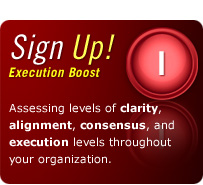Some Thoughts On Job (and Life) Satisfaction
January 28th, 2008
One of my favorite areas of research is job and life satisfaction – and how business leaders can structure their team to be both profitable financially and to enhance the lives of the individuals making up the team at the same time. I recently came across some thoughts on the components of a satisfied life and thought I’d share some of my views on how these components can enhance both your life and your organization.
I was reading about a theory of life satisfaction that made the claim that, in essence, all people want 3 things from life: (1) to be, (2) to know and (3) to enjoy. As I thought about all of the journal articles I’ve read, experts I’ve spoken with, and experiences I’ve had in my 15 years in this field, this sounded like a pretty reasonable claim to me. So, I began to think a lot about these three categories and how they might relate to not only a better life, but also a better team and/or business.
- To Be: One of the most common complaints I hear from clients is that they feel as though they are not allowed to be who they feel they really are or say what they really think on the job. They believe that if their bosses heard what they really thought, they would be at best snubbed or ostracized – and at worst fired or demoted. As a leader myself, I realize that it can sometimes be quite challenging to hear someone say they believe I am wrong – especially when they are younger or “less experienced” than I am. However, after reading books like The 7 Habits, Good to Great and The Lexus and the Olive Tree, I became very interested in actually rewarding disagreement with me – and have found that the entire team is now “thinking with” me instead of always trying to think how to make what I say needs to happen a reality. I feel I’ve received 3 very important payoffs for this practice: (1) more and more great ideas are generated in our meetings – many by people other than our leadership team, (2) fewer and fewer bad ideas make it into our strategic plan because in order to do so, they must stand up to the scrutiny of many individuals instead of a few leaders and (3) more people stay with our team for longer periods of time – even when they have higher-paying opportunities elsewhere. I think it’s important to note that item 3 includes me and some of the other leaders at our organization – we have all turned down numerous (sometimes more financially lucrative) opportunities with other teams in order to keep leading our own. I have heard some of them say that the reason for this is our strong emphasis on trying to allow them to be who they are – and plug them into jobs based on who they are/what they love to do rather than who I would like them to be. I could not agree more, personally – it is the number 1 reason I started my own firm: to be who I am as much as possible.
- To Know: Another common complaint I hear from clients (and had myself before I began leading my own organization) is that they often do not feel as though they know what is expected from them – or how to accomplish what is expected. As someone who gets the opportunity to interact with hundreds of college students every year, I often enjoy lively debates with students about whether or not our eductation system is facilitating our natural enthusiasm for both gaining knowledge and asking questions that enhance one’s clarity about how to do a good job in work and life. What these students often conclude is that our educational system sometimes falls short in this area – and often serves to deaden their natural enthusiasm for knowing. The result? People who get into the work force who have been convinced that knowing is actually a burden instead of a major contributor to life and job satisfaction (they often think that they are lucky to no longer “have” to read books anymore, for example). Our firm has found that 2 things are very important to re-awaken this natural desire to know: (1) teach people how to create clarity – both from a leadership standpoint and from the employee’s perspective and (2) show them how to get back in touch with an enthusiasm for knowing how to continuously be better at what they do. We have found that this is a strong 1-2 punch in terms of releasing individual’s natural desire to know what is expected and continuously learn how to deliver it in more and more impressive ways (instead of simply getting enough done to keep the boss off one’s back). We’ve found that helping people to discover what they love to do and create SMART Goals related to that passion is often very helpful here – and that the need to motivate someone externally decreases the more someone is again enthusiastic about “knowing” how to do something well and what is expected of them.
- To Enjoy: I think this one is a “no brainer.” From the boardroom to the classroom to the living room, people often have the same complaint: I don’t enjoy my work, my courses and/or my life as much as I would like to. On the other hand, it seems that many people are actually encouraged to feel guilty if they are enjoying themselves too much on the job or at home. “You must not be working hard or long enough – or not be dedicated enough to this job if you are consistently enjoying yourself,” is a statement that they often believe they will hear – or even believe themselves – if they begin enjoying themselves too much on the job. My experience and research in this area (along with many others, including Dr. Mihaly Csikszentmihalyi – author of the classic book, Flow: The Psychology of Optimal Experience) has led me to 2 conclusions: (1) many of us have not been trained in how to enjoy our jobs and our lives and (2) many people are victims of being punished for showing too much enjoyment in their lives. We think it is important to train our team members in how to make their jobs and lives more enjoyable (yes, there are many proven techniques of making things more enjoyable – I’ve found that many people are not aware of the power they have over their own enjoyment levels). We also believe it is valuable for us to encourage them to goal-set in ways that challenge them enough to keep them energetic and useful to their team, but to avoid setting goals in ways that deaden their enjoyment levels. It is a tough balancing act (enjoyment lies between boredom and anxiety), but one we’ve found to be critical to an energetic team that consistently looks forward to making things happen.
It is probably obvious how these three factors can improve life satisfaction, but I think it is often not as obvious how they can positively enhance one’s team or organization. I thought a summary of my observations of how, being, knowing, and enjoying positively impact teams and businesses:
- Encouraging others to be themselves can enhance team-wide idea-generation, motivation, confidence, trust, and loyalty.
- Helping people to rediscover their natural love of knowing/learning can energize your team to become clearer about your expectations and more enthusiastic about discovering how to deliver these expectations in a constantly-improving way.
- A focus on job and life enjoyment can serve to further enhance the factors discussed above and create a culture that people look forward to being a part of.
In the end, what’s the return on investment? To me, I’ve found that a focus on these three areas allows a business to become a powerful cycle of both success and satisfaction – for leaders, employees, clients – and a small section of the world. If team success can be linked to individual being, knowing, and enjoying, it means that your business can become a mechanism of enhancing your profits while encouraging job satisfaction and personal growth – something that everyone involved with your organization can be proud of.
Just a couple of thought I had as I read about these three life-enhancing variables – I look forward to your thoughts on this article!
Article Filed under: IV. Miscelaneous



9 Comments Add your own
1. Brian Mistler | January 28th, 2008 at 8:22 pm
Yes! (1) to be, (2) to know and (3) to enjoy. You’ve nailed it. This trifecta of business and life success is at the core of the best (the rarest) training programs. And, in my experience as a therapist and executive leadership consultant, when someone really gets one of them… really gets it… they quickly get the other two. That’s how interlinked these three things are. Very well said Dr. Higley — thank you.
2. Brian Higley | January 28th, 2008 at 9:34 pm
Thanks for your comments, Brian. I think you are exactly right – getting one of these steps makes it that much more likely that you get them all. Very well said!
3. Katie Ray | January 31st, 2008 at 8:56 pm
You mentioned “encouraging others to be themselves can enhance…” Can you give some examples of good ways to encourage others in this way?
Also, I feel it is important to surround yourself with people that have ‘got these 3 things down’ or are working to understand these 3 things. It is encouraging for someone working on getting at least 1 of them down. I suppose I should take your observations into account for those that feel they cannot be themselves, have little enthusiasm for learning, and/or feel that seeking enjoyment is punishable. Then through my actions I could help people in their own life satisfaction.
4. Brian Higley | February 2nd, 2008 at 9:48 pm
Thanks for stopping by again, Katie,
Very good comments! Regarding mechanisms of encouraging others to be themselves, there are quite a few, but here are some that I think work well:
1. Tell people that you value their thoughts and feelings – even if you do not share the same thoughts/feelings all the time. I think the first step is affirming that this is a value you hold. This is important, but talk can be cheap, so . . .
2. Back up item 1 with rewarding people when they are themselves, even if being themselves means disagreeing with you – and try to avoid punishing them for doing so as much as possible. Comments like, “I disagree with you, but value your opinion – let me think about that,” or “Thanks for pointing out where I was off-base there – that was great,” could be good examples of this. Frowning, complaining, putting others down and/or threatening (including doing so behind their others’ backs) are ways that we can punish others for being who they are.
3. Make a commitment to investigate how it is that you get upset or uncomfortable when others think/feel differently from you. Often, being angry or hurt simply because others are expressing themselves is an indication that one has some inner conflicts that may need to be resolved in order to allow people to be themselves around you. Talking this through with a trusted friend or an experienced professional can pay big dividends here, in my experience!
Those are a few specifics on this topic that come to mind off the top of my head. Hope they are helpful, Katie!
5. Richard Van Wagner | February 3rd, 2008 at 9:06 pm
When reading this piece I found myself easily agreeing with how important the three characteristics are. From my perspective ,balancing the three seems to be the greatest challenge. In contemplating your points on our educational system the thought arises that the reason our current system does not greatly inspire the natural curiosity and educational inclinations of its students to want to learn may in fact be rooted in society’s directive of “you have to get an education ” versus “you get to have an education.” Besides that somewhat philosophical perspective the idea that getting an education is a destination of sorts and not so much a process to be enjoyed endorses the view that it is something to simply get done which does little to promote self motivated learning by choice.
Hopefully these wanderings make some sense.
Regards, Richard
6. Brian Mistler | February 3rd, 2008 at 9:16 pm
Makes A LOT of sense (to me) Richard!
We have in this country a system of diplomas, with occasional traces of education. I also appreciate your locating the problem as much in “society’s directive” as you do in individual students. As a college instructor myself, I find most students are simply responding to their accurate perceptions about how the system works. And, most of their previous education has DISCOURAGED curiosity, punishing people for thinking outside the box/textbook.
Let’s change it!
7. Brian Higley | February 10th, 2008 at 1:55 pm
Richard and Brian,
Great thoughts on how the current system may be doing the opposite of what it intends to do (decreasing motivation for learning/knowing rather than increasing – or perhaps simply staying out of the way of – humans’ natural desire to learn). I agree that it is not the students’ fault at all – it seems to me that the current system often does impose “have to’s” onto a natural “want to” (knowing/learning) – which is a recipe for de-motivation more often than not. I think this is a matter that is of great importance as we try to encourage others to reconnect to their natural love of learning/knowing.
Thanks for stopping by again, Brian and Richard!
8. Rick Maurer | February 22nd, 2008 at 8:49 am
To be. . .to know. . .to enjoy. . . I love the simplicity and the depth of those three themes. Well done.
Rick Maurer
http://www.beyondresistance.com
9. Brian Higley | February 22nd, 2008 at 1:37 pm
Thanks for stopping by again, Rick,
I think some of the most profound things in life (and in business) are often the most simple. Too bad so many of us are looking for more complicated solutions to life’s challenges – often at the expense of being, knowing and enjoying!
Thanks again, Rick
Trackback this post | Subscribe to comments RSS Feed
Leave a Comment
Some HTML allowed:
<a href="" title=""> <abbr title=""> <acronym title=""> <b> <blockquote cite=""> <cite> <code> <del datetime=""> <em> <i> <q cite=""> <s> <strike> <strong>